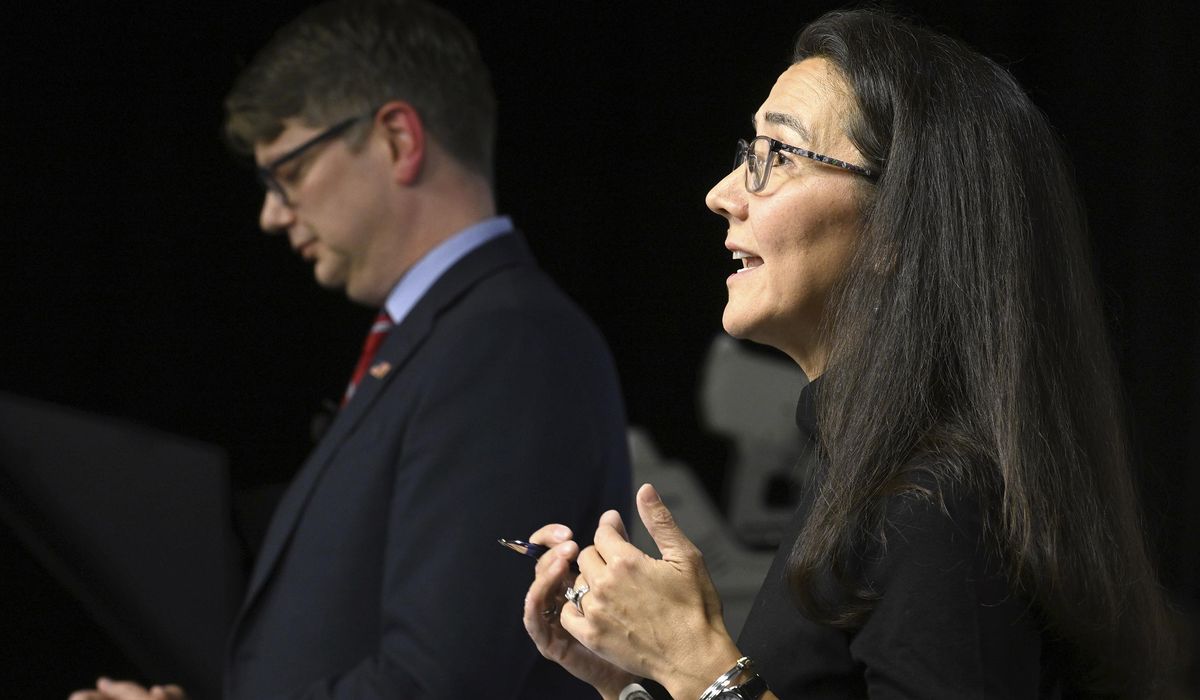


An incarcerated felon in New York could cost Democrats a House seat — or even the House — by siphoning votes from Alaska Rep. Mary Peltola, a scenario made possible under the state’s top-four primary and ranked-choice voting system.
Democrat Eric Hafner is one of four candidates listed on the November ballot vying to be the state’s sole House representative, even though he’s serving a 20-year sentence at Otisville Federal Correctional Institution in New York and, as far as anyone knows, has never lived in Alaska.
The inmate entered the state’s open primary held in August and placed sixth with a scant 0.4% of the vote. Then the third- and fourth-place finishers — both Republicans — withdrew from the race, moving Hafner to the fourth position.
The result? The final four general election ballot now features two Democrats — Ms. Peltola and Hafner — as well as Republican Nick Begich and Alaska Independence Party candidate John Wayne Howe.
Despite having no known ties to Alaska, Hafner is likely to pull a few Democratic votes from the incumbent, improving the odds for Mr. Begich — who lost in 2022 when he and former Gov. Sarah Palin split the GOP vote, handing victory to Ms. Peltola.
With control of the House expected to come down to a few seats, the Hafner candidacy could swing the balance of power in Congress.
Alaska Democratic Party Chairman Mike Wenstrup described the situation as “embarrassing for our state.”
But the way Phil Izon sees it, the shenanigans illustrate one of the perils of the ranked-choice voting/open-primary system adopted by voters in 2020.
“The Democrats in Alaska say they like ranked-choice voting and jungle primaries, but they actually sued to kick this guy off the ballot,” said Mr. Izon, who heads the Yes on Ballot Measure 2 campaign to repeal ranked-choice voting.
Indeed, the Alaska Democratic Party sought to disqualify Hafner, but the state Superior Court demurred, holding that while state law requires congressional representatives to be residents, it doesn’t say anything about candidates.
“The Democrats don’t want to be forced to be affiliated with this incarcerated felon,” Mr. Izon said. “But, hey, you guys asked for this.”
Certainly Alaska Democrats didn’t ask for an out-of-state prisoner to act as a spoiler for Ms. Peltola’s reelection bid, but they did provide a template on how to game the final four.
In 2022, Ms. Peltola placed fourth in the open primary for the special election to replace Republican Rep. Don Young, who died in office. Ahead of her were Ms. Palin, Mr. Begich and Democrat-backed independent Al Gross, who had run for Senate.
Then Mr. Gross dropped out, and no candidate was moved up to replace him. The result was that red-state Alaska elected a Democrat to the House even though 60% of voters cast their first-round election ballots for one of the Republicans.
The Alaska Supreme Court later ruled that the Division of Elections should have kept Mr. Gross’ name on the ballot because he withdrew after the deadline.
This time, Mr. Begich, a businessman and grandson of the former congressman with the same name, leads Ms. Peltola 49% to 45% in a Cygnal poll conducted Oct. 14-16, with Mr. Howe taking 4% and Hafner picking up 2%.
Hafner may be behind bars thousands of miles away in New York, but he’s running a relatively active absentee campaign, filling out an online position statement and responding to questions by media outlets.
“I’m a Democratic socialist. I’m a progressive. I’ll work with [Sen.] Bernie Sanders and AOC [Rep. Alexandria Ocasio-Cortez] to implement a better America for working-class Americans,” Hafner told Fairbanks NBC affiliate KTVF. “I support Medicare for all. I support free college. I support student loan debt relief. I’m a true progressive.”
He’s also a jailed con man. Hafner ran in the 2018 House Democratic primary in Oregon’s Congressional District 3 and the 2016 House Republican primary in Hawaii’s Congressional District 2.
Hafner, who’s serving time for threatening public officials in New Jersey, also expressed a strong interest in American Indian rights, saying he would support a National Indigenous Congress based in Fairbanks modeled after the United Nations.
Mr. Begich is supporting Mr. Trump and has his endorsement.
Ms. Peltola has declined to endorse anyone in the presidential race. “I think both of our presidential candidates have flaws,” she said during an Oct. 10 debate.
• Lindsey McPherson contributed to this story.
• Valerie Richardson can be reached at vrichardson@washingtontimes.com.
